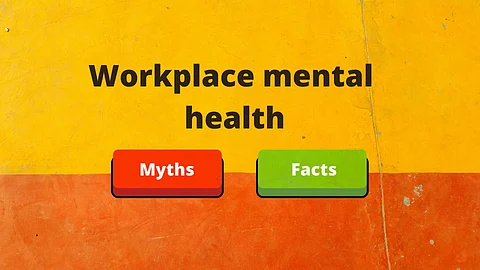
- Mental health mattersMental health matters
- Mental IllnessMental Illness
- Life stagesLife stages
- Caregiving
- Workplace Mental Health
- Legal Matters
- Subscribe

Myth: I’ve been diagnosed with a mental illness. I can never get back to work
Fact: After treatment and/or therapy, it is important to check with your psychiatrist and/or therapist about the progress you have made and determine whether you are ready to get back to work. If you are getting back to work after a break, it is recommended that you actively look for openings in organizations that are known to be inclusive. Understanding and assessing whether the workplace is the right one for you is important.
Myth: I can never tell my manager/colleagues about my mental health.
Fact: Today, a number of workplaces offer support for mental health issues. Check if your organization communicates a sense of awareness, trust, safety and comfort about mental health issues. While there is absolutely no compulsion or obligation to let your employer know about your mental health, making them aware about the condition you have been diagnosed with may help them understand, empathize and offer the support you may need. You can also be selective about how much information you share, depending on what you know and understand about the organisation. Speak to your manager and negotiate a workload that suits you, ask for flexible work timings so that you can plan your work in a way that it does not affect your productivity.
Myth: People with mental illness do not fare well at the workplace and are often poor performers.
Fact: People with mental illness may need certain accommodations, but with the right support of therapy and medication, and with a supportive environment, they can be as productive as someone who does not have a mental illness. In fact, they may even go the extra mile, simply because they want to prove themselves. Severe mental illnesses that are not being treated, may however, result in compromised performance.
Myth: Policy change is the only thing that can help create inclusive workplaces.
Fact: While it is essential for every workplace to draft and implement policies that encourage inclusivity, being an inclusive workplace takes much more than just that. It’s a two-way street where you and the management contribute equally for mutual benefit. Sometimes, even in the presence of an inclusive policy, as an employee you may be expected to follow a certain code of conduct simply because the organization wants it. And in the absence of a policy, you can make a difference — in your capacity as an employee — by being supportive, empathetic and inclusive. So inclusivity is not only a function of the right policies being in place, but also of the collective culture and mindset of the organization.
Myth: There are no healthy workplaces.
Fact: Even though there is no ideal workplace, there are several that are considered to be healthy workplaces. What makes them so is acceptance of differences, encouragement from leadership, meeting of well-being and safety standards, being genuinely inclusive, paving clear and open communication channels, establishing a positive, supportive culture and appreciating you when your work is good.
Myth: Bullying, incivility and harassment are bound to be part of work culture.
Fact: Bullying, incivility and harassment are behaviors that are completely unacceptable in workplaces, and can have an impact on your mental health. Such behavior must not be meted out or tolerated. If you face this behavior, you must report it to the management at the earliest. You may also try to figure out the organization’s stance around bullying, as this will help you know what your options are and what steps you can take.
With inputs from Maullika Sharma, director at Workplace Options.
We are a not-for-profit organization that relies on donations to deliver knowledge solutions in mental health. We urge you to donate to White Swan Foundation. Your donation, however small, will enable us to further enhance the richness of our portal and serve many more people. Please click here to support us.
